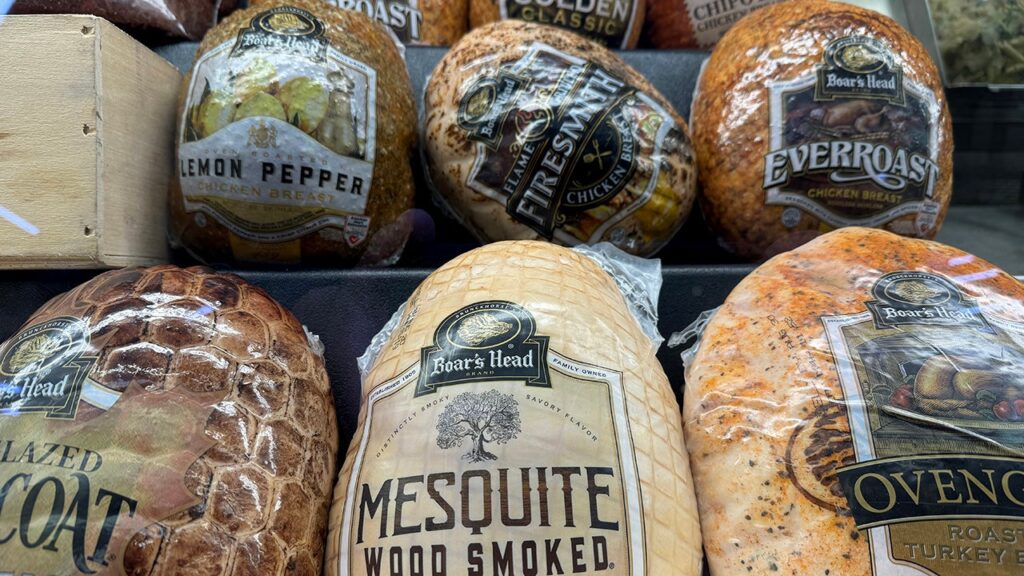New Yorkers are feeling the pinch in their wallets after a Listeria outbreak damages 7 million pounds of cold cuts. (Credit: WNYW)
Federal health officials say the death toll from a listeria outbreak linked to Boar’s Head deli meat is increasing.
The Centers for Disease Control and Prevention (CDC) has declared this Listeria outbreak to be the largest since one was linked to cantaloupe in 2011.
The Centers for Disease Control and Prevention (CDC) released an updated report Wednesday saying that about 14 new cases and six deaths have been reported since early August as a result of continuing outbreaks linked to sliced meats at deli counters, including Boar’s Head brand liverwurst.
As of Wednesday, 57 people in 18 states have been infected with the outbreak strain of Listeria, all of whom have been hospitalized, including a pregnant Minnesota woman who is suing the company, claiming she “nearly lost her unborn baby” after contracting Listeria from eating Boar’s Head deli meat sold at a Publix supermarket in Florida.
According to the CDC, nine people have died, including one in Illinois, one in New Jersey, one in Virginia, one in Florida, one in Tennessee, one in New Mexico, one in New York and two in South Carolina.
Boar’s Head recalls 7 million pounds of deli meat after listeria infections linked to the food
Boar’s Head did not respond to FOX Business’ request for comment.
The CDC reported that epidemiological, laboratory, and traceability data indicate that sliced meats at delis, including Boar’s Head brand liverwurst, are contaminated with Listeria monocytogenes and making people sick. Health officials in several states have reported that unopened Boar’s Head products have tested positive for the same strain of bacteria that is making people sick in this outbreak.
Boar’s Head products at a Publix grocery store in Athens, Georgia. (Jeffrey Greenberg/Universal Images Group via Getty Images)
Health department investigators found about 70 violations over the past year at the Boar’s Head, Virginia, plant that produces the recalled meat, according to USDA Food Safety and Inspection Service records obtained by CBS News under the Freedom of Information Act.
Records of “non-compliances” cited by USDA inspectors at the Jarratt plant included incomplete paperwork, meat left on equipment, and leaks and pools of water.
Boar’s Head Recall: Woman files class action lawsuit against deli company
According to the documents, the company had been cited multiple times for mold and mildew growth around the facility, as well as insect infestations in and around processed meat products at the plant.
A recall notice is displayed next to Boar’s Head meat on display at a Safeway store in San Rafael, California on July 31, 2024. (Justin Sullivan/Getty Images)
In January, inspectors also noticed a “black mold-like substance” throughout the room.
The USDA did not respond to FOX Business about whether the company faced any enforcement actions due to its violations.
Boar’s Head told CBS that all operations at the plant have been suspended and no more product will be shipped until the plant “meets the highest quality and safety standards.”
Click here to get FOX Business on the go
Boar’s Head meat is displayed at a Safeway store in San Rafael, California on July 31, 2024. (Justin Sullivan/Getty Images)
In a statement on its website, Boar’s Head said that after it was notified by the Maryland Department of Health that samples taken from Boar’s Head Strassburger brand liver sausage tested positive for Listeria monocytogenes, it immediately recalled the product “along with nine other products produced on the same day on the same production line.”
“Once it was discovered that our liverwurst was linked to the deli meat infection, we took immediate and decisive action,” the company said. “In the interest of public health and safety, we have recalled all products produced at the plant that made the liverwurst as a precautionary measure. We conducted this widespread, precautionary recall because we believe it is the right thing to do.”
All Boar’s Head products currently sold in food retail and food service establishments are not being recalled and are not related to the current outbreak, the company said.



